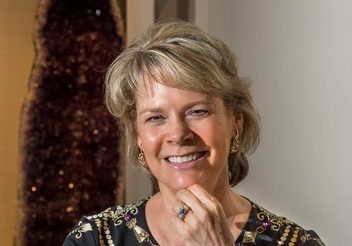Patricia Syvrud
Minerals, Materials and Society Program Manager at University of Delaware

Education: M.B.A. (University of Southern California), B.S. in Business Administration (University of New Hampshire), Graduate Gemologist (G.G.) designation (Gemological Institute of America), coursework in Physical Geology, Mineralogy and Optical Mineralogy (University of Sao Paulo, Brazil)
Describe your job. What are some of the most important tasks or duties for which you are responsible?
I oversee the marketing, promotion and management of new programs within the University of Delaware’s Department of Geography: the new B.S. in GIScience and Environmental Data Analytics, the GIScience graduate certificate, and the new Minerals, Materials and Society (MMS) program including the MMS graduate certificate. In addition to fundraising for research, sourcing graduate internships, program promotion and managing the administration of the MMS graduate certificate program, I also oversee the development of the Jewelry Development Impact Index, a socio-economic index for the jewelry trade.
What attracted you to this career path?
Even though the entirety of my working career prior to UD has been in the jewelry industry, I have always been attracted to education and academia. My passion lies with responsible sourcing and responsible minerals trade and addressing the issues surrounding the most vulnerable part of the extractives supply chain, artisanal and small-scale miners (ASM). Applying location-specific GIScience and understanding supply chain risk are robust tools for making a positive impact on the ASM sector.
How has your education/background in geography prepared you for this position?
Arriving in academia and specifically in geography and responsible sourcing has been a culmination of many years’ effort, education and experience. Although my education is in business, physical geology, mineralogy and gemology, geography-specific knowledge and awareness has had a huge impact on the work I’m currently involved in, including as a member of the Board of Directors of the U.S. Kimberley Process Authority (USKPA: https://www.uskpa.org/) and the Governance Committee of the Public Private Alliance for Responsible Minerals Trade (PPA: https://www.resolve.ngo/site-ppa/default.htm)
What geographic skills and information do you use most often in your work? What general skills and information do you use most often?
Given the many blockchain initiatives in the responsible minerals and jewelry trade, skill in and understanding how to harness location-specific data is particularly important in enhancing the transparency and sustainability of extractive supply chains.
Given the varied tasks involved with my position at UD, my skills in project/program management and oversight are utilized daily. As a marketer for the programs, my ease and skill as a public speaker and networker, and ability to work with others are also called upon regularly.
Are there any skills or information you need for your work that you did not obtain through your academic training? If so, how/where did you obtain them?
My most valuable skill NOT obtained through academic training is public speaking. A certain part of this is inherent in my DNA, i.e., not having a fear of speaking in front of small and large groups, and the rest is practice and experience.
What advice would you give to someone interested in a job like yours?
Follow your passion and think outside the box. If you can’t find a job in your area of interest, don’t be afraid to volunteer your time which can lead to employment opportunities.
What is the occupational outlook for career opportunities in your field/organization, esp. for geographers?
The US Department of Labor’s Bureau of Labor Statistics predicts 15 percent growth in the need for geographic information specialists between 2018 and 2028, much faster than the average for all occupations.